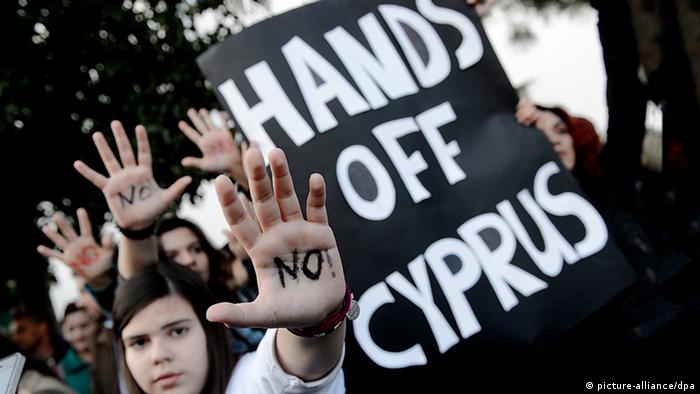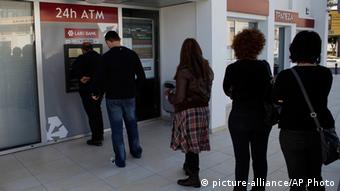The Cypriot parliament has rejected the levy on savings deposit, a condition of the island nation’s EU bailout deal. DW examines the options available to Nicosia moving forward.
Cypriot lawmakers overwhelmingly rejected the conditions of its bailout on Tuesday, with not a single parliamentarian voting in favor the bank deposit tax. Thirty-six representatives voted against the bailout terms while 19 abstained.
After nine months of negotiations, the EU had agreed on a rescue fund allowing Cyprus to get 10 billion euros ($13 billion) to fund its national budget. Almost 99 percent of the funds are needed to stabilize Cyprus' banks, which were heavily affected by Greece's debt "haircut" last year. The banks' combined total assets are eight times as high as Cyprus' yearly economic output. In comparison, the European average is 3.5.
Cyprus, in turn, is required to provide 5.8 billion euros out of its own pocket. The plan was to tax bank accounts. Initially, only the rich were supposed to pay up. But Cyprus had opted to tax small savers as well.
But that option was pulled after it became clear that the measure would fail in the Cypriot parliament. On Tuesday morning, Cyprus' government proposed changes to the controversial EU rescue plan. Savings of up to 20,000 euros would have been exempt from getting taxed. Savings from 20,000 to 100,000 euros in turn would have paid a one-off tax of 6.75 percent. EU finance ministers had agreed to these changes in a conference call.
But Cyprus’ parliament voted down the new proposal, raising concerns about the future of the bailout and the island nation’s solvency.
'Systemic for eurozone'
Cyprus' President Nico Anastasiades had argued the unpopular tax was the only way to prevent the country from insolvency. Either the banking system would crash - followed by a disorderly bankruptcy - or Cyprus would see "the scenario of a painful but controlled management of the crisis." Only the EU rescue fund is able to secure banks, 8,000 jobs and reduce Cyprus' debt level to a somewhat sustainable standard.
Yet there needs to be some kind of agreement, particularly since Cyprus is "systemic for the eurozone," says Olli Rehn, the European Commissioner for Economic Affairs. Cyprus' collapse would not endanger Europe as a whole, because its economic performance is low when compared to other eurozone countries. Even the Greek economy is almost 12 times as big. Germany's economic performance is 145 times as high as Cyprus' performance.
But Cyprus is systemic for the euro currency, according to European Central Bank board member Jörg Asmussen. "A bankruptcy of Cyprus and its banks would have indirect consequences for the eurozone as a whole - concerns about the reversibility of the euro would start all over again," Asmussen said.
And if markets, investors or other economic players were to have second thoughts about the euro's continuity, they might pull out their funds from the eurozone.
ESM stabilization
According to the European Stability Mechanism (ESM) treaty, rescue measures are justified to stabilize the single currency. Money can be transferred if it's "indispensable to safeguard the financial stability of the euro area as a whole and of its Member States," as stated in article 3 of the treaty.
According to the head of the euro bailout fund, Klaus Regling, direct cash injections for Cypriot banks were still out of the question. "The current legal situation doesn't allow the ESM to directly interfere with banks," Regling said on Monday. Such measures would only become available when the European banking supervision comes into effect next year. Regling points to Spain where ESM funds are currently transferred to the government that then in turn hands them over to Spanish banks.
Asmussen also stressed that the Cypriot banks would be kept on life support via the Cypriot central bank's emergency assets. But these funds are only made available if the banks provide the necessary securities. That has raised questions as to whether the struggling banks are actually able to place sufficient deposits.
Long-term measures
In the long run, Cyprus will be able to reorganize its finances by selling state-owned companies such as telecommunications, electricity suppliers and its harbors. According to an analysis carried out by the Royal Bank of Scotland (RBS), Cyprus also has untapped gas reserves worth more than 600 billion euros. But Cyprus would only benefit from this in the long haul. Such measures wouldn't help them recover from the current crisis.
Raising corporate taxes would immediately help as Cyprus has purposely kept taxes low to attract businesses. Its corporate tax currently stands at 10 percent - that's a record low in Europe. Cyprus plans to increase this tax to 12.5 percent, which would account for 200 million euros per year.
Cyprus also plans to tax interest income. These interest-bearing deposits account for 70 billion euros, and more than half of that money comes from abroad, primarily from Russians and Brits. Russia is also likely to extend a credit of 2.5 billion euros until 2021 and is willing to lower the interest rate. But all these measures can't save Cyprus from going bankrupt.
The Republic of Cyprus has been a member of the EU since 2004, and it introduced the euro in 2008. EU law only expands to Cyprus' south, though, as the north is a separate entity that is only recognized by Turkey as the Turkish Republic of Northern Cyprus.
With a GDP of 18 billion euros in 2011 and a population of 862,000, Cyprus is one of the smallest of the EU's economies. The country was hit by a recession in 2012. Unemployment rates are on the rise: From 7.9 percent in 2011 to an estimated 13 percent in 2013. The recent debt crisis has made it difficult to navigate. At the end of 2011, debt accounted for 71.1 percent of GDP. The European Commission expects that number to rise to 97 percent by 2014. dw de



Comments